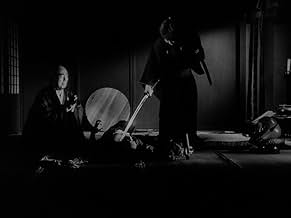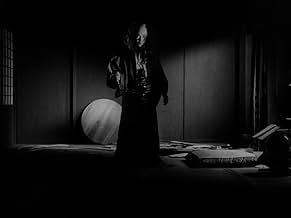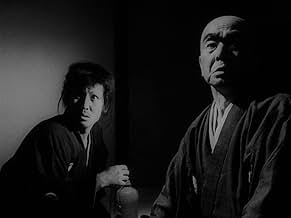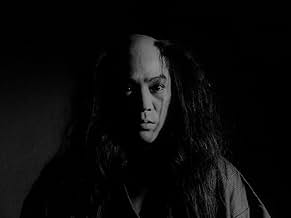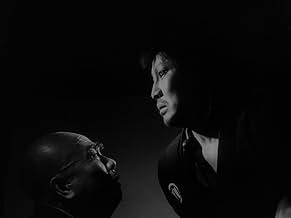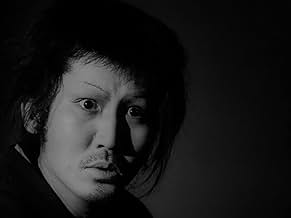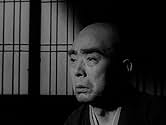IMDb RATING
7.9/10
3.2K
YOUR RATING
After being robbed by a geisha, a ronin warrior carves a bloody path to seek revenge.After being robbed by a geisha, a ronin warrior carves a bloody path to seek revenge.After being robbed by a geisha, a ronin warrior carves a bloody path to seek revenge.
- Director
- Writers
- Stars
- Director
- Writers
- All cast & crew
- Production, box office & more at IMDbPro
Featured reviews
Demons is an adaptation of Tsuruya Namboku's play Kamikakete Sango Taisetsu, a kabuki theater classic based on an episode of the 47 rônins. It goes deeper, darker and crueler, than any other samurai movies I've seen. its pure malice. And thrives on diabolical suspense. Its a mans journey through hate and revenge, and his descent into madness, it is slow, painful and bloody. A remarkable exercise in cynical nihilism that is so breathtakingly grim that it becomes undeniably compelling. Along with Katsuo Nakamura's haunting performance in the lead role.
The story is not realistic. The setting and the intruducing course of action is undoubtly surreal, and almost every character in Demons is unsympathetic and devious with the possible exception of Hachiemon, who is so selfless in his sacrifices for his master that he becomes annoyingly obsequious. But thats part of the films appeal.
Matsumoto adopts an expressionist aesthetic similiar to the theatrical- play. And the editing accumulates false starts and several scenes are repeated almost identically, first dreamed then in real life. This can be very confusing and it creates incessant ruptures which breaks the narrative fluidity.
Demons is not perfect but its appeal is one you rarely see in cinema, and, of course, it has an extrodinary story and directing which thus class thus as one of world-cinemas timeless gems.
The story is not realistic. The setting and the intruducing course of action is undoubtly surreal, and almost every character in Demons is unsympathetic and devious with the possible exception of Hachiemon, who is so selfless in his sacrifices for his master that he becomes annoyingly obsequious. But thats part of the films appeal.
Matsumoto adopts an expressionist aesthetic similiar to the theatrical- play. And the editing accumulates false starts and several scenes are repeated almost identically, first dreamed then in real life. This can be very confusing and it creates incessant ruptures which breaks the narrative fluidity.
Demons is not perfect but its appeal is one you rarely see in cinema, and, of course, it has an extrodinary story and directing which thus class thus as one of world-cinemas timeless gems.
If anyone imagined how a Greek tragedy would look if it was set in feudal Japan, look no further. It is a harrowing, exhausting, depressive experience, but it's worth it. The film follows a once great warrior, now a Ronin (for those unfamiliar, Ronin is a samurai without a master), named Gengobe, who has sold all of his property to repay his debts. He is in love with a geisha who is to be married to a rich lord, unless someone pays 100 Ryō for her liberty. Once he realizes that he was being played by this geisha and her husband, of whose existence he was unaware of, he becomes hell bent on revenge.
The film emits a strange sense of reality distortion. The film begins with a dream sequence, that is somewhat foreshadowing of things to happen. This theme is prevalent throughout the film. We can see things unfolding, only to realize that it was just a thought, or a fantasy of a certain characters. Reality tends to be different, albeit sometimes it can lead to the same conclusion. What was particularly striking was the way the graphic scenes of violence were portrayed. They were slowed down, they almost feel other-wordly, yet these graphic scenes are strangely beautiful. Highly contrasted Black and white cinematography helps this, we see characters illuminated against dark background like phantoms and the black blood coming out of the wounds becomes even more noticeable.
Shura is a tale of vengeance than leads all the parties involved into an abyss of some sort. There is no bright light at the end of the tunnel. Because of mere 100 Ryō, these people have turned into "Demons" and they're lives became "Hell". This film isn't disturbing because of its visual content, but because of its emotional impact. Gengobe isn't a typical hero, the reason why one would want to root for him is because he is an agent of justice (like Monte Cristo), but not because he himself is a virtuous hero worth rooting for. It's easy to hate most, if not all of the characters, but at the same time, it's difficult not to feet pity for them. Seldom comes a film that makes one feel this way.
This film is not for everyone, it's extremely pessimistic, it doesn't offer glimmers of hope. It's not an easy watch, but it's worth it. I highly recommend it to anyone who is interested in film as an art form.
The film emits a strange sense of reality distortion. The film begins with a dream sequence, that is somewhat foreshadowing of things to happen. This theme is prevalent throughout the film. We can see things unfolding, only to realize that it was just a thought, or a fantasy of a certain characters. Reality tends to be different, albeit sometimes it can lead to the same conclusion. What was particularly striking was the way the graphic scenes of violence were portrayed. They were slowed down, they almost feel other-wordly, yet these graphic scenes are strangely beautiful. Highly contrasted Black and white cinematography helps this, we see characters illuminated against dark background like phantoms and the black blood coming out of the wounds becomes even more noticeable.
Shura is a tale of vengeance than leads all the parties involved into an abyss of some sort. There is no bright light at the end of the tunnel. Because of mere 100 Ryō, these people have turned into "Demons" and they're lives became "Hell". This film isn't disturbing because of its visual content, but because of its emotional impact. Gengobe isn't a typical hero, the reason why one would want to root for him is because he is an agent of justice (like Monte Cristo), but not because he himself is a virtuous hero worth rooting for. It's easy to hate most, if not all of the characters, but at the same time, it's difficult not to feet pity for them. Seldom comes a film that makes one feel this way.
This film is not for everyone, it's extremely pessimistic, it doesn't offer glimmers of hope. It's not an easy watch, but it's worth it. I highly recommend it to anyone who is interested in film as an art form.
'Shura' also known as 'Demons' or 'maybe even better known as 'Pandemonium' is second feature by great experimenter Toshio Matsumoto. It is one of the most experimental samurai films I have ever seen, and one of the most disturbing revenge stories. The film begins with colorful sun setting to transform into bleak black and white cinematography. After a geisha deceives a samurai and robs him together with her husband, the samurai starts the bloody and twisted path of revenge that unravels many secrets and treats the viewer with such twists that makes M. Night Shyamalan go green with jealousy. The film is cool mixture of classic samurai movies and film-noir with the tasty sauce of Matsumoto's experimental techniques. More straightforward and less surreal than the director's better known 'Funeral Parade of Roses'.
A very slow burn of a horror movie. I had no idea what to expect from a Japanese movie from the 1970s. I've seen very few Japanese films overall, and definitely no horror ones.
I honestly have no idea how to contextualize this one. I have absolutely no frame of reference for what I just watched. Certainly unlike any film (that I know of) that was released before this. This makes me want to watch more Japanese films, and definitely more Japanese horror. That is the mark of a great film.
I wasn't sure whether I read the genre properly for this film because the build up is not typical of the genre.
Once it gets going it does not stop. And the circular storytelling is so satisfying. I wasn't feeling this one until it gets to around the halfway point and I realized this wasn't just horror for horror's sake. Really interesting film that I want to revisit someday, probably next October.
Hopefully I'll have a more nuanced understanding of the Japanese film scene by then.
I honestly have no idea how to contextualize this one. I have absolutely no frame of reference for what I just watched. Certainly unlike any film (that I know of) that was released before this. This makes me want to watch more Japanese films, and definitely more Japanese horror. That is the mark of a great film.
I wasn't sure whether I read the genre properly for this film because the build up is not typical of the genre.
Once it gets going it does not stop. And the circular storytelling is so satisfying. I wasn't feeling this one until it gets to around the halfway point and I realized this wasn't just horror for horror's sake. Really interesting film that I want to revisit someday, probably next October.
Hopefully I'll have a more nuanced understanding of the Japanese film scene by then.
I don't know that there's anything in this movie which blew me away, but there was also nothing which bothered me either. I suppose the plot is a fairly straightforward revenge story, but the stylistic elements of the film were more than enough to save the film. For instance, I liked the usage of darkness and shadows in several scenes. I don't know if I can quite put my finger on why those elements work, but something about seeing various characters appear/disappear from the shadows gives the film a dreamy aesthetic. I also liked how certain scenes were repeated. Through these scenes, you get a sense of Gengobei imagining how he wants to behave in certain situations or how some of the violence he commits or witnesses it etched into his head. These scenes also cause the film to become a subjective experience which puts you in Gengobei's headspace really well. Finally, the high level of violence also surprised me. While certain elements like the slow motion and the (relatively) high levels of blood help in this regard, that most of the deaths are prolonged gives them even more staying power. All things considered, this is definitely the most violent classic samurai film I've seen. As I said at the start of this review, I wouldn't say this film blew me away, but I do have a lot of respect for the film's technical qualities. It's a stylistically impressive take on the revenge film which is so unique with its craft that you eventually stop caring about its somewhat barebones plot.
Did you know
- TriviaIncluded among Letterboxd's Top 250 Horror Films.
- How long is Demons?Powered by Alexa
Details
- Runtime2 hours 14 minutes
- Color
- Sound mix
- Aspect ratio
- 1.37 : 1
Contribute to this page
Suggest an edit or add missing content


